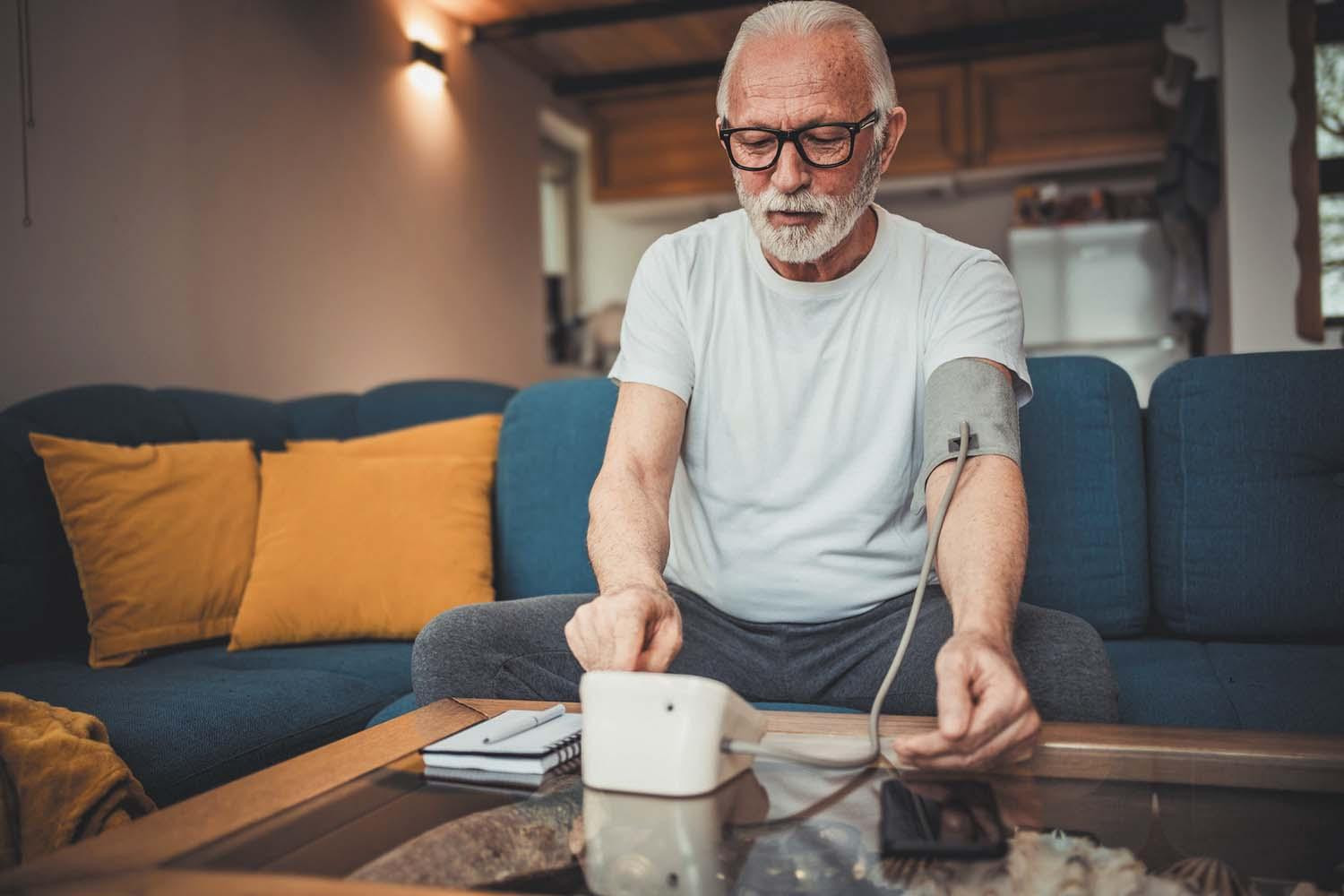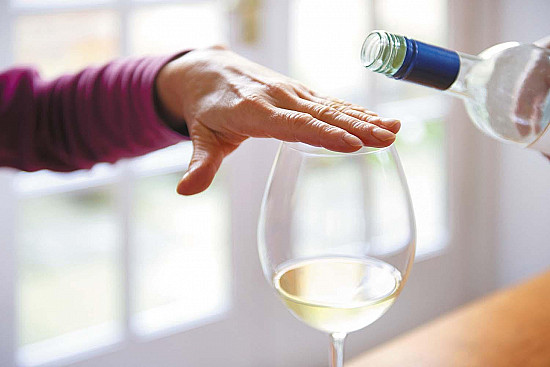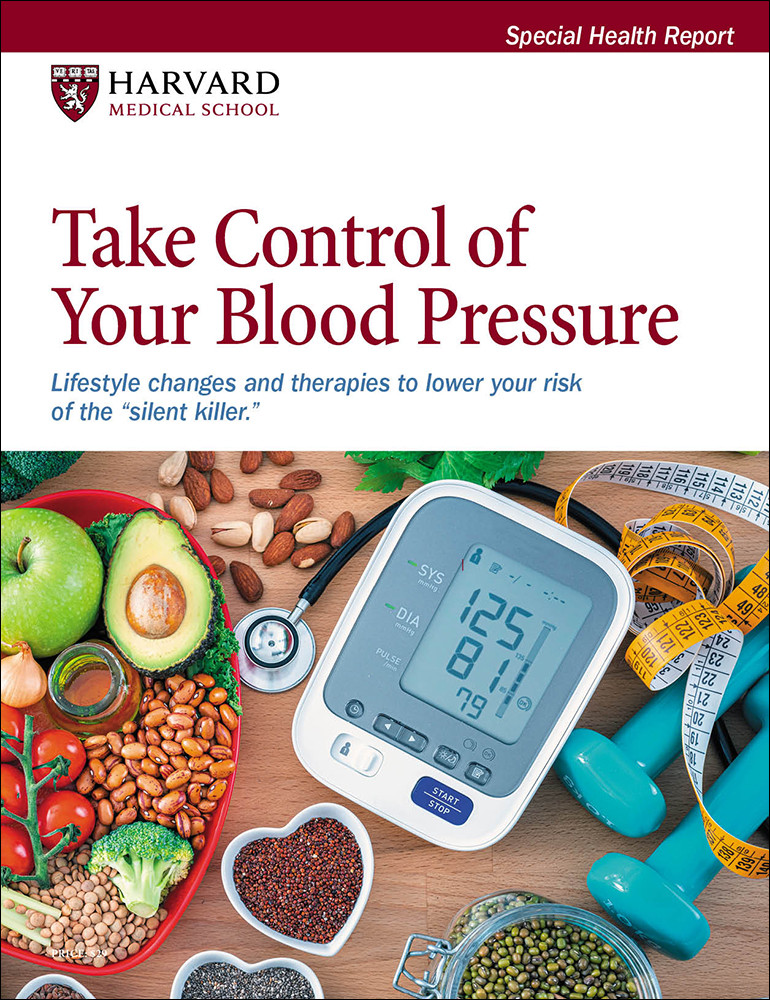Take back your blood pressure control!
When you're not getting the results you want, consider changing your habits.
- Reviewed by Anthony L. Komaroff, MD, Editor in Chief, Harvard Health Letter; Editorial Advisory Board Member, Harvard Health Publishing

Many factors can sabotage your efforts to control high blood pressure. You might have an underlying condition, such as sleep apnea, that contributes to the problem. Or you might be taking medication, such as a nonsteroidal anti-inflammatory drug (NSAID), that interferes with your blood pressure medicine.
But often, the main culprit that keeps blood pressure high despite treatment is lifestyle. So it’s time to regain control of your blood pressure by examining key areas that you can likely improve on your own. Here are five to start with, as recommended by Dr. Stephen Juraschek, a blood pressure specialist at Harvard-affiliated Beth Israel Deaconess Medical Center.
Diet
Diet is a common saboteur of blood pressure treatment. For example, if you eat too much salt (or sodium), the body retains fluids. Increased fluid inside blood vessels raises the pressure in them. “Sodium negates some of our best first-line treatments of high blood pressure, such as diuretics, which promote fluid excretion,” Dr. Juraschek says.
Potassium also plays a role in high blood pressure. If you’re not consuming enough of this mineral, you won’t reap its benefit of helping the body remove sodium. And eating a lot of saturated fat can lead to high cholesterol and plaque buildup in arteries, which can narrow and stiffen them, contributing to high blood pressure.
What you can do: For stubborn high blood pressure, Dr. Juraschek advises limiting sodium to 1,500 milligrams (mg) per day and following the Dietary Approaches to Stop Hypertension (DASH) diet, which is rich in fruits, vegetables, lean proteins, beans, nuts, seeds, and vegetable oils.
He also urges you to read food labels, even for foods that seem healthy (like whole-grain breads, low-fat dairy products, and fresh poultry). “Sodium is in most foods in the grocery store, and the levels can be stunning. I found one salad dressing with a third of the daily salt allowance in just two tablespoons,” says Dr. Juraschek says.
And try to increase your potassium intake. While it can be difficult to reach the recommended daily amount (4,700 mg), it’s still worth eating more potassium-rich foods — fruits (particularly bananas, oranges, avocados), leafy greens, and legumes. Also, replacing table salt with a potassium-enriched salt substitute can help.
Weight
Being overweight keeps blood pressure high in numerous ways. For example, extra pounds trigger inflammation (which harms blood vessels) as well as the release of hormones that impair blood pressure regulation.
What you can do: Commit to losing weight if you need to. A panel of experts concluded that for every 22 pounds a person loses, he or she may be able to reduce systolic blood pressure (the top number in a measurement) by 5 to 20 millimeters of mercury (mm Hg) — enough to make a real difference when you’re aiming for blood pressure less than 130/80 mm Hg.
Weight-loss strategies include eating a healthy diet, reducing calorie intake, exercising, getting enough sleep (seven to nine hours per night), and managing stress. For someone with obesity, Dr. Juraschek says he might also prescribe a GLP-1 receptor agonist, such as semaglutide (Wegovy), liraglutide (Saxenda), or tirzepatide (Zepbound). “It helps reduce body mass and circulating cholesterol, and it’s related to a reduction of 3 to 4 points in systolic blood pressure,” he says.
Alcohol intake
Alcohol is often responsible for high blood pressure that won’t come down. That’s because heavy, long-term consumption of alcohol can increase body chemicals that make you hold on to water and that keep your blood vessels from relaxing normally. Both effects contribute to high blood pressure.
What you can do: Dr. Juraschek says you don’t need to stop drinking alcohol altogether if your high blood pressure isn’t coming down. But he does advise patients — both men and women — to limit their alcohol intake to no more than one drink per day.
Physical activity
A sedentary lifestyle leads to stiff arteries and impaired blood vessel function, which are major causes of high blood pressure. Exercise helps reverse that.
Both strength training and aerobic activity (the kind that gives your heart and lungs a workout) trigger the production of nitric oxide, a molecule that relaxes and widens blood vessels. Both types of exercise also strengthen the heart, helping it pump blood more efficiently, which reduces the strain on your blood vessels.
What you can do: Try to strengthen your muscles twice a week, perhaps using resistance bands or doing body-weight exercises at home, or using the weight machines at a gym. And aim for 150 minutes per week of moderate-intensity aerobic exercise, such as brisk walking, water aerobics, or riding a stationary bike.
If you haven’t exercised in a long time, make sure it’s okay with your doctor first. Then, start with five minutes of exercise per day, gradually increasing the amount over time.
Your medication schedule
The late U.S. Surgeon General C. Everett Koop famously said that drugs don’t work if you don’t take them. That’s often the reason why someone’s blood pressure remains high. “Poor medication adherence can be due to many reasons, such as costs, side effects, inconvenient dosing schedules, complicated drug regimens, forgetfulness, or simply not believing the medications will help,” Dr. Juraschek says. “Unfortunately, people who don’t take their blood pressure pills are more likely to die prematurely.”
What you can do: If you have a complicated medication regimen or you need reminders to take your pills, use tools like an automatic pill dispenser, a medication diary, a smartphone alarm, or a reminder app (popular ones include MyTherapy and Medisafe).
If you’re concerned about medication side effects or costs, reach out to your doctor; it may be possible to switch to another drug.
Other areas
The five aspects of lifestyle we’ve listed are just part of the equation to help tame high blood pressure. Other areas are also important: if you smoke, you’ll need to quit; and if you have poor sleep, high stress, or high caffeine intake, you’ll need to work on those, too.
“It’s always going to be important to modify your lifestyle regardless of whether you’re taking medications to get your blood pressure down,” Dr. Juraschek says. “If you don’t make lifestyle changes, your health — and your blood pressure — will likely get worse.”
This article is brought to you by Harvard Health Online+, the trusted subscription service from Harvard Medical School. Subscribers enjoy unlimited access to our entire website, including exclusive content, tools, and features available only to members. If you're already a subscriber, you can access your library here.
Image: © Milan Markovic/Getty Images
About the Author

Heidi Godman, Managing Director
About the Reviewer

Anthony L. Komaroff, MD, Editor in Chief, Harvard Health Letter; Editorial Advisory Board Member, Harvard Health Publishing
Disclaimer:
As a service to our readers, Harvard Health Publishing provides access to our library of archived content. Please note the date of last review or update on all articles.
No content on this site, regardless of date, should ever be used as a substitute for direct medical advice from your doctor or other qualified clinician.
















